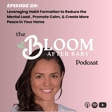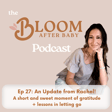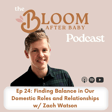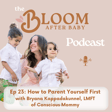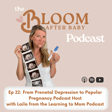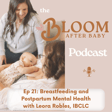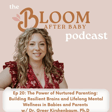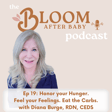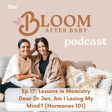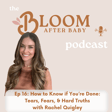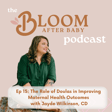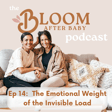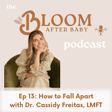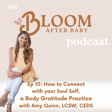
8. Rethinking How We Talk About Pregnancy Weight Gain: A Return to Intuition, with Jen & Rachel
Reclaim your relationship with food, your body, and your SELF in pregnancy and postpartum. Jen and Rachel share some personal stories + professional wisdom for navigating uncomfortable body changes in pregnancy and postpartum.
In this episode we discuss:
- cringy body comments from strangers AND providers
- societal attitudes about body size and shape, and how that can impact our mental health in pregnancy and postpartum
- limitations of pregnancy weight gain guidelines
- a quick overview of intuitive eating practices
Special thanks and credit to the original intuitive eating pros, and whose amazing work we reference in this episode, Evelyn Tribole, MS, RDN, CEDRD-S & Elyse Resch, MS, RDN, CEDS-S, Fiaedp, FADA, FAND
Links and resources mentioned in the episode:
Intuitive Eating Books and Workbooks
Counselors and Dietitians Trained in Intuitive Eating
If you or a loved one is struggling with an Eating Disorder, please check out the National Eating Disorders Association for resources, education, and support.
You can learn more about Rachel's California-based group therapy practice and how you can work with her at www.racheldaggettlmft.com or on instagram @rachelscouch
Our FAVORITE Food & Nutrition Influencers/Accounts:
If you enjoyed this episode and appreciate what we share here, we would be so honored if you shared the show and tagged us, @bloomafterbaby on Instagram so that we can see it and connect with our listeners!
We’d also be so grateful if you would rate and review our podcast in your favorite podcast app, because that’s the best way for a new podcast to get more people to listen so we can keep growing!
*Please note that this podcast is intended for educational purposes only, and is not a substitute for seeking individualized care from a mental health or medical professional*
Learn more about us and access all of our courses, services, and free resources at bloomafterbaby.com
Pregnancy Postpartum wellness Prenatal care New motherhood Postpartum recovery Maternal health Pregnancy journey Expectant mothers Postpartum support Motherhood experience Parenting advice Family dynamics Parenting tips Raising children Family well-being Parenting challenges Family relationships Parenting insights Mental health for mothers Emotional well-being Coping with motherhood Maternal mental health Self-care for moms Nutrition Health and Wellness OBGYN
